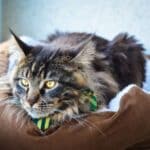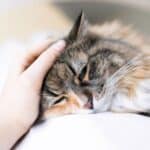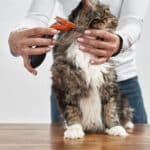Maine Coons are considered to be one of the largest domestic cat breeds in the world. They’re popular for their furry appearance, sturdy built, and personality in many households. While they’re quite a healthy breed in cats, they’re more inclined to develop hip dysplasia over the years compared to other cat breeds.
If you’ve got a Maine Coon, then you’d want to make sure that you keep a check on their movements and ensure their health is in order over the years. Here, we talk about hip dysplasia found in Maine Coons in detail for you.
Jump to:
- What is Hip Dysplasia in Maine Coons?
- Symptoms of Hip Dysplasia
- Why are Maine Coon More Likely to Develop Hip Dysplasia?
- Treatment for Hip Dysplasia in Maine Coons
- Surgery Cost for Hip Dysplasia in Maine Coons
- Aftermath of Leaving Hip Dysplasia Untreated in Maine Coons
- How to Help Your Maine Coon with Hip Dysplasia?
- Bottom Line
What is Hip Dysplasia in Maine Coons?
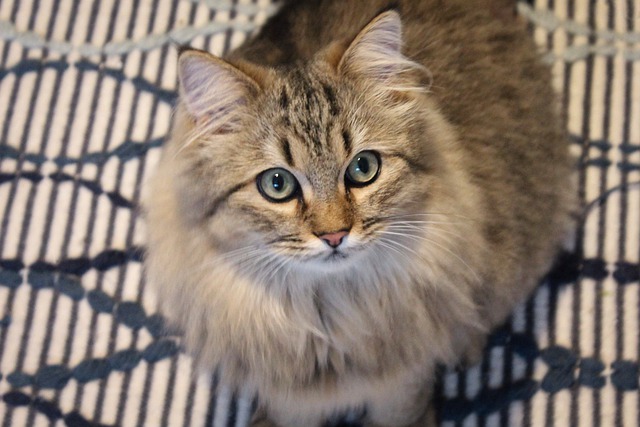
Hip dysplasia is a common problem that occurs in feline as they grow older. It’s when the ball and socket joint connecting the femur and pelvis doesn’t work effectively. Over time, the consistent rubbing against the pelvis gives way to pain and inflammation in the area. It’s causes quite the discomfort for cats.
Maine coons are more susceptible to getting hip dysplasia as opposed to other cat breeds. This is because of the fact that these cats have a smaller gene pool which can lead to a possibility of higher genetic issues than others. Since these cats have developed in the wild, they’re considered to be quite strong. And so, you can make sure that they overcome their hip dysplasia with the help of the relevant treatments.
Symptoms of Hip Dysplasia
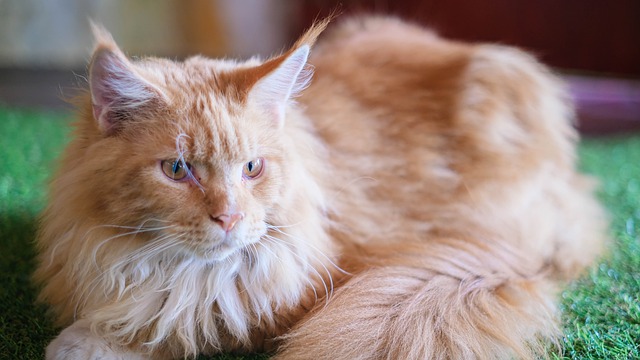
There are multiple symptoms of hip dysplasia that you’ll commonly see in Maine Coons. Here’s a list of the more prominent ones:
- Irritability
One of the more popular symptoms that you’ll find is that your Maine Coon will highly likely show signs of irritability. Since cats are experts at hiding their pain, it’s no brainer that your cat’s not going to showcase any signs of pain if they have hip dysplasia. Instead, you’ll find them to be highly irritable most of the times.
Essentially, make sure that you keep an eye out for aggressive behavior without the presence of an environment that demands it. It’s an indirect sign for you where your Maine Coon’s telling you that they’re not well.
- Limited Movement
Hip dysplasia causes a lot of discomfort, and so your Maine Coon will not want to move too much. They’ll want to limit their movements and stay in one place for longer durations. If you see anything like this, then you should pay attention to it immediately.
Along with this, if you notice that your cat is less active than usual, you should get to the root cause of the change. It can surprise you as to how much your cat’s daily movement changes can tell you. If you see limited movement paired with aggression or irritability, you should get it checked as soon as possible.
- Different Gait and Stance
Every cat has a distinct style in how they carry themselves; their gait and stance is quite distinctive. The problem arises when your cats has a change in such movements. A Maine Coon with hip dysplasia will show visible signs of having trouble walking or moving.
Typically, you’ll find them struggling to put pressure on their back legs. So, you’ll see them swaying or dragging their back legs. In many situations, your Maine Coon might also limp if they have hip dysplasia. If you see such obvious signs, you shouldn’t hold back – take them to the vet immediately.
- Change in Muscle Mass
A more obvious symptom that you’ll see in your Maine Coon is a change in muscle mass in their legs. Since they’ll be putting more pressure on their front legs, you’ll see more muscle on their front legs. Not only this, but you’ll also see that your feline friend’s back legs appear to be weaker.
If you see that you’re Maine Coon’s front legs have a more muscular appearance than their back legs, take a closer look and observe their behavior. It’s crucial to do so, so that you’re able to get them to the vet immediately in case they need treatment for hip dysplasia.
Why are Maine Coon More Likely to Develop Hip Dysplasia?
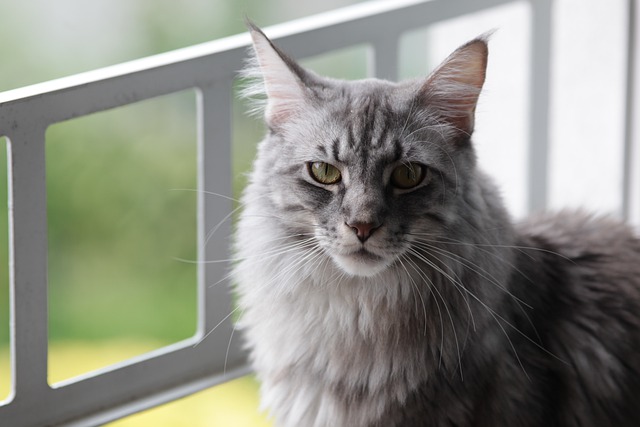
You might be wondering why Maine Coons are more likely to develop hip dysplasia. The truth is that any cat breed can develop this issue, but Maine Coons have a higher susceptibility to it due to their nature.
Given their wild nature and a small genetics pool, there’s a high chance for them to develop hip dysplasia. Their large body types are another major reason why this is more common for Maine Coons than other domestic cats.
Treatment for Hip Dysplasia in Maine Coons
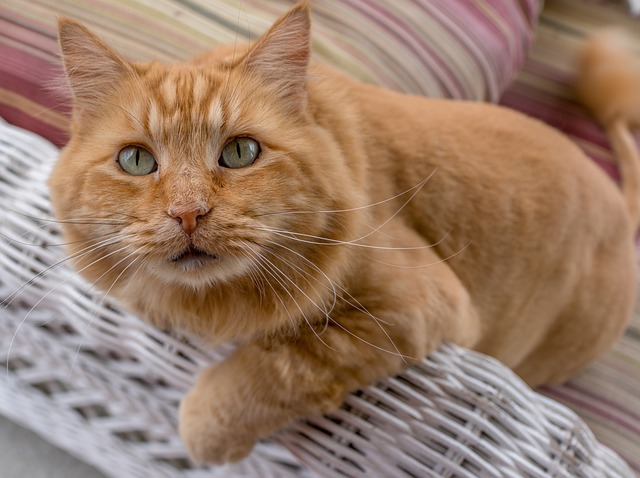
A good thing that you should know is that there are multiple ways that you can treat hip dysplasia in your Maine Coon. Let’s have a look at the different ways that you can help your Maine Coon get treatment for hip dysplasia.
- Weight Management
The first thing that you can do for your cat is ensure that you’re maintaining their weight properly. You should generally be focusing on giving your Maine Coon a balanced diet and maintain a good weight because one of the leading causes of hip dysplasia is obesity.
So, before anything else, you must make sure that you’ve got multiple activities and a balanced diet planned for them to ensure you manage their weight. Reach out to your vet and seek advice on what the best meal plan for your Maine Coon is. Follow through with these plans regularly so that there’s no possibility for your cat to develop hip dysplasia.
- Pain Management
In the unfortunate situation that your Maine Coon develops hip dysplasia, you can help them overcome their pain through the right kind of treatment. Pain from hip dysplasia is one of the most difficult things that your Maine Coon will have to bear. You can make it easier for them with the help of their vet.
Reach out to your Maine Coon’s vet and go over what can effectively help reduce pain levels for your cat. Anti-inflammatory medicine and painkillers work greatly for this, so make sure that you ask your vet to advise on what will work best for your Maine Coon.
- Physiotherapy
Hip dysplasia can cause a lot of pain and stiffness for your Maine Coon. One great way to overcome the pain and stiffness is through physiotherapy. It’s a low intensity method that involves gentle movements to help your cat get rid of the excessive stiffness in their pelvis area.
More often than not, you’ll find this to be prescribed with other treatments for hip dysplasia as it’s highly effective and helps cats improve their symptoms to a great extent.
- Surgery
In severe cases, vets advise to go for surgery to get rid of the consistent pain and ensure better health for your Maine Coon. The good thing is that Maine Coons are extremely healthy and sturdy cats. Therefore, you’ll see them recover faster and show positive results after getting surgery for hip dysplasia.
There are different kinds of surgeries that the vet might suggest, based on the condition of your Maine Coon. These include the Triple Pelvic Osteotomy, Juvenile Public Symphysiodesis, Excision Arthroplasty, and Hip Replacement. Each of these comes with different procedures and surgery costs.
Surgery Cost for Hip Dysplasia in Maine Coons
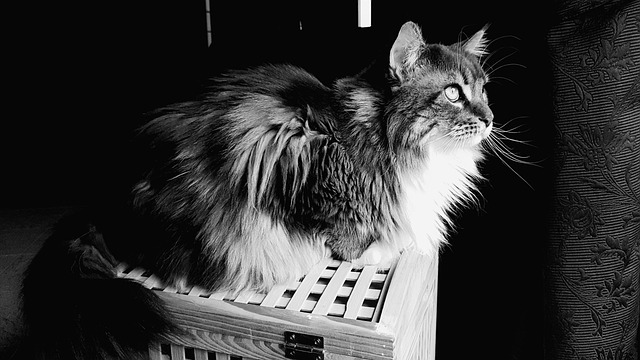
As a Maine Coon parent, you’d want to make sure that your feline friend is in good health at all times. Here’s what you need to know about the different surgeries that take place for hip dysplasia in Maine Coons, along with the approximate cost associated with them.
- Juvenile Pubic Symphysiodesis
This one’s only applicable to cats that are six months or under. So, if your Maine Coon develops hip dysplasia in their early months, then this is what your vet will advise you to go for. The approximate cost for this around $800, so you should be financially ready to take care of your Maine Coon. The surgery involves fusing the hip and joint together for better stability.
- Triple Pelvic Osteotomy
The triple pelvic osteotomy is also another method of surgery used for young cats under the age of one. The surgery takes place by rotating the joint to reduce the intensity of grinding and ensure less pain. This one is a costlier option than the first one, amounting to around $1,500.
- Femoral Head and Neck Incision
The more commonly opted for surgery for Maine Coons is the femoral head and neck incision. The name of the surgery implies that procedure of the same as a large incision is made on the feline. While it sounds daunting, it is far less aggressive than other options out there.
The surgery has a relatively lower recovery time as well. So, your Maine Coon is likely to recover within a few weeks. The approximate cost for this surgery ranges from $1,500 to $3,000. It’s a good alternative for long-lasting results.
- Hip Replacement
Lastly, you can go for the entire hip replacement surgery for your Maine Coon as well. This takes longer to recover as it is a highly invasive surgery. Not only this, but it’s costlier as well. A hip replacement surgery will cost you around $4,000 or even more.
Aftermath of Leaving Hip Dysplasia Untreated in Maine Coons
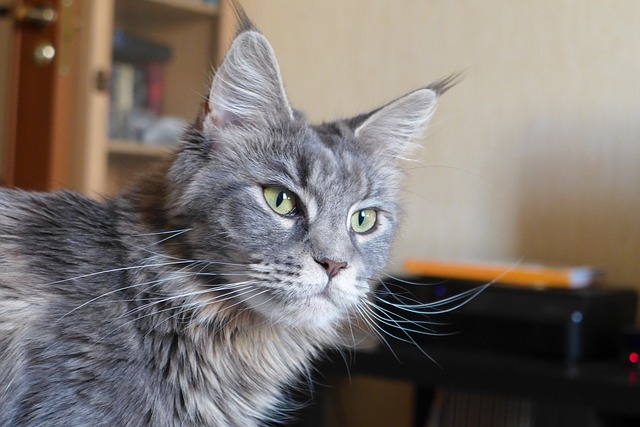
Not paying attention to the symptoms and leaving hip dysplasia untreated in Maine Coons puts a serious risk to their health. You’d want to make sure that your furry friend lives a long and happy life. However, if you fail to get them treated for hip dysplasia, then their health is likely to derail as they’ll be in a lot of pain at all times and not be able to use their back legs.
How to Help Your Maine Coon with Hip Dysplasia?
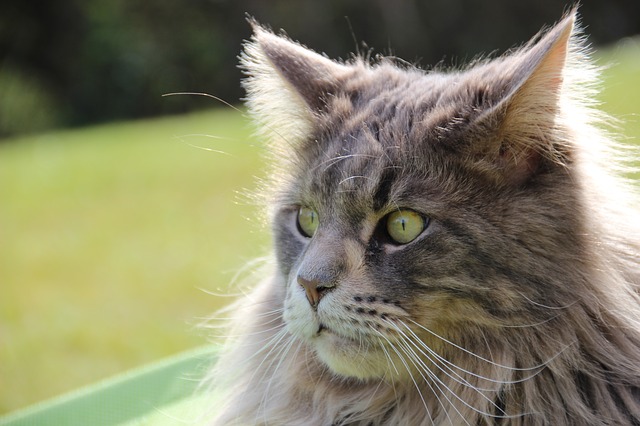
There are multiple things that you can do to ensure that your Maine Coon with hip dysplasia gets the right amount of help.
- Help Your Maine Coon Maintain a Healthy Weight
Make sure that you incorporate daily activities and a health plan that allows your Maine Coon to maintain a healthy weight. Don’t focus on anything strenuous that might harm them. Pick easy things that they can do and make it a regular habit.
- Help Your Maine Coon Manage Pain Better
Managing pain can be difficult as hip dysplasia comes with a lot of pain. Get your hands on painkillers and give your Maine Coon daily physiotherapy to help them minimize their pain.
- Help Your Maine Coon by Switching Up Playtime
Playtime doesn’t always have to be extremely aggressive and filled with excessive movements. You can focus on other ways to keep your Maine Coon engaged and ensure that they’re not falling prey to staying idle.
- Help Your Maine Coon with Swimming
Swimming is a great way to help your Maine Coon build their back muscles and improve their movements. Plan out a day or two during the week where you can take your Maine coon swimming to help build their muscle and improve movement.
- Help Your Maine Coon by Making Things Easily Accessible
You want to make sure that your Maine Coon is comfortable when in such conditions. And so, it’s best that you move their things around and make their food, water, and litter more accessible to them.
- Help Your Maine Coon by Adding the Right Furniture
Get access to ramps and steps that you can add close to locations with height. This will ensure that your Maine Coon doesn’t have to jump up and down to get to the desired location. It’ll be easier for them to get to you and ensure that they feel more comfortable in the house.
Bottom Line
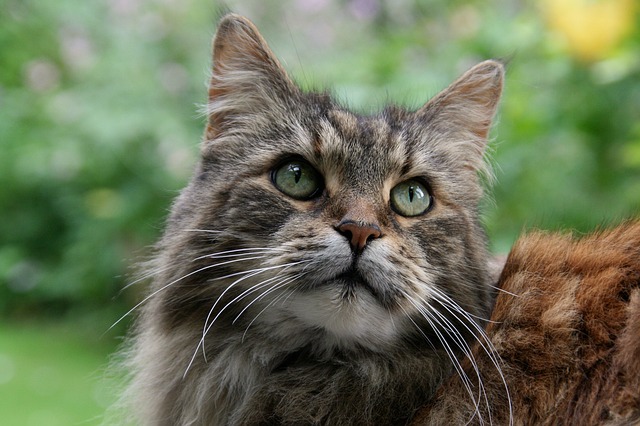
All in all, Maine Coons are pretty healthy animals that can overcome all kinds of health issues. All you need to do is make sure that you take extra caution and get them treated at the right time once you start seeing symptoms of hip dysplasia. Given the right treatment, your Maine Coon’s going to get in better health in no time.

